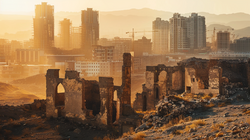Pax
| Pax | |||
|---|---|---|---|
| Federal city | |||
 |
|||
|
|||
| Nickname(s): The Desert Crossroads, The Cistern City | |||
| Motto: "From Ancient Springs, New Prosperity" | |||
| Country | |||
| Original settlement | 1536 AN | ||
| Founder | Babkhan Empire | ||
| Government | |||
| • Mayor | Claudette Montijo | ||
| Population (1730 census) | |||
| • Total | 288,769 | ||
| Demonym | Paxites | ||
Pax is a federal city located in central Eura and the interior of Oportia. The city has 288,769 inhabitants according to the 1730 census, making it one of the country's significant urban centers and a major transport hub connecting the coastal regions with the interior.
History
The original city of Pax was established by the Babkhan Empire in 1536 AN in the desert regions of central Eura. The Babkhans constructed an extensive network of underground cisterns to support the settlement in the arid environment, which remain the city's primary water source today.
Following the Babkhan Holocaust in 1580 AN, the city lay in ruins for over a century. It was refounded in 1712 AN by settlement companies that mainly hired workers from Natopia and Nouvelle Alexandrie. It was common at the time for the Compagnie Generale d'Oportie and other settlement companies involved in Oportia to hire foreign workers. These companies built upon the ancient foundations of the city while establishing modern infrastructure. The city was granted federal status upon joining Oportia in 1712 AN.
The discovery of significant Alexandrium deposits in the surrounding desert in 1734 AN transformed Pax into a major mining center, attracting workers and investment that fueled rapid urban growth and industrial development.
Geography and climate
Pax is situated in the desert interior of central Eura, serving as a crucial transport junction between coastal cities and inland regions. The city's location in an arid environment has shaped both its architecture and urban planning, with buildings designed to provide shade and conserve water.
The Pax Cisterns, an extensive underground water storage system built by the original Babkhan inhabitants, continue to serve as the city's main water reservoir. This ancient engineering marvel consists of interconnected underground chambers carved from rock, capable of storing millions of liters of water collected during seasonal rains.
Economy
Pax serves as the center of Oportia's Alexandrium mining industry, with several major extraction operations in the surrounding desert. The city's economy is built around mining, processing, and transportation of Alexandrium, making it one of the wealthiest cities in the region despite its harsh environment.
The city also functions as a major transport hub, with railway lines and highways connecting the coastal cities of Vanie and Port de Huile with the interior regions. Major connections to Constancia and Zeed via road and rail pass through the city. This strategic position has made Pax an important center for logistics and trade.
Infrastructure
The Pax Cisterns
The Pax Cisterns represent one of the most impressive examples of Babkhan engineering still in use today. This underground network of water storage chambers, carved directly from the bedrock beneath the city, provides the primary water supply for Pax's population and industrial operations. The cistern system includes over 200 interconnected chambers and has been expanded and modernized since the city's refounding.
Pax International Airport
Pax Euran Union Station
Pax Metro System
OMB Libertas
Nakhjavani Tower
Notable people
- Claudette Montijo, current mayor and daughter of former Federal Representative Galilea Montijo;
- Clarke Lahaye, former senator and "peace candidate" in the Liberal Progressive Party of Oportia primary.

